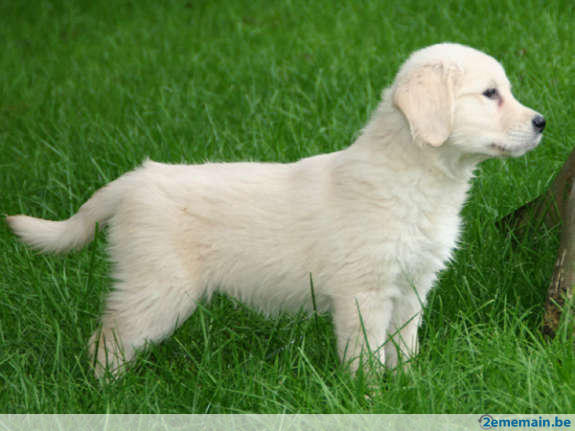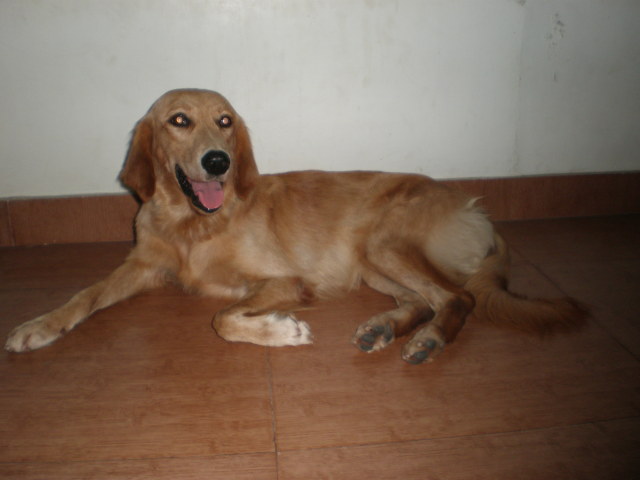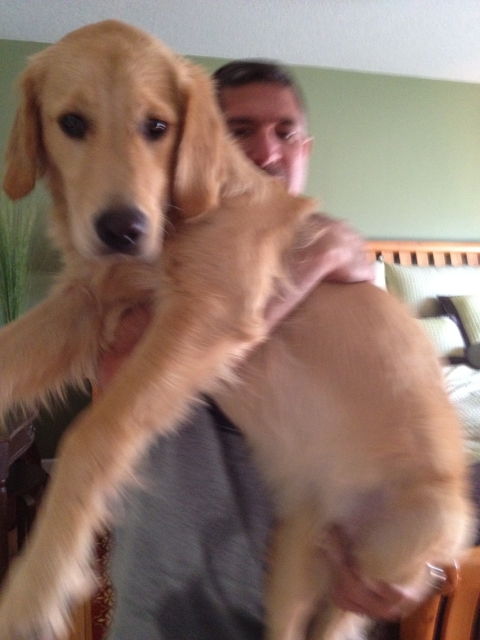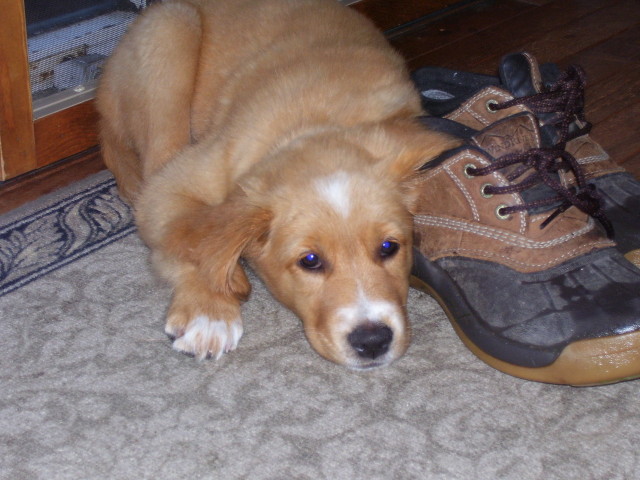QuestionI have had my new GR puppy for a week (she's 7 weeks old, now), and I'm afraid I'm expecting too much from her. This is causing moments of intense frustration on my part, and it seems like things are regressing in house breaking her than they are progressing. At what age should I see her housebreaking improve? Should she be improving now?
I'm using crate training (it worked with another dog I had about 4-5 years ago, she died, though), and my current puppy used the bathroom (# 1) in it twice last night. My previous dog NEVER used the bathroom in her crate, although I cannot remember how old she was when I started crate training her.
Also, I would like to explain that I'm a teacher, and I cannot take her to school. I am NOT putting her in her crate while I'm at school (I know she can't hold it that long, and I don't want her to learn it's OK to use the bathroom in her crate). I'm putting her in the kitchen, instead, and I've put a baby gate up in the doorway to keep her in there.
So, basically, am I expecting too much at this age? At what age should I expect things to become noticeably better? And, is it normal that she's using the bathroom in her crate at this age? Thanks!
AnswerPuppies vary from one to another. Many are dry overnight by 8-9 weeks. Some it is another month or 2. You really should try to figure out a way of giving her a mid day break. If you don't have any family that can, maybe a neighbor, or if you could find one, a professional dog walker. Besides relief, they need a meal and the attention. One thing that makes a big difference is having a rack in the crate to keep the puppy dry, and cleaner. I explain it and more below.
Much of housebreaking is not training the puppy, but making it easier for your
puppy, you, and your carpet while its body to catches up to its instincts. At
around 8 weeks when the puppy goes to its new home, the time from when it
realizes it has to go, and when it can't wait any longer is a matter of
seconds. Only time will fix that. You can hardly be expected to be attentive
enough to avoid all accidents There is no sense punishing the puppy for your
inattention. It is not fair to punish you either, but you still have to clean
it up if you didn't have the puppy outside in time.
Housebreaking starts before you get home with the new puppy. If you don't have
a crate, buy one. I prefer the more enclosed, den like plastic ones. Skip the
bedding. At first it gets wet, and later it can be chewed into choking
hazards. A wire rack in the bottom will help keep the puppy up out of
accidents at first. They are available with the crates, but a piece of closely
spaced wire closet shelving from a home supply place is cheaper. If you
already have a metal crate, covering it may help. Just make sure you use
something the puppy can't pull in and chew. Dogs that start out in crates as
little puppies, accept them very well. Never leave an unattended puppy loose
in the house. If nobody can watch it, put it in the crate. I suggest letting
the dog have its crate all its life.
Choose a command and spot you want it to use. The less accessible to strays,
the less chance of serious disease. If it is a female, choosing a
non grassy spot will avoid brown spots later. When you bring it home, take it
to the spot and give it the command in a firm, but friendly voice. Keep
repeating the command and let the puppy sniff around. If it does anything,
praise it. Really let it know what a good dog it is and how much you love it,
and maybe a treat. Note, being out there not only means you can praise it,
but it also keeps it from being snatched by a hawk. If it doesn't go, take it
inside and give it a drink and any meals scheduled. A young puppy will need to
go out immediately afterward. Go to the spot and follow the above routine.
Praising it if it goes is extremely important. If it doesn't go, take it back
inside and put it in its crate and try again soon. Do not let it loose in the
house until it does go.
At first it is your responsibility to know and take the puppy out when it
needs to go. It needs to go out the first thing in the morning, after eating,
drinking, and sleeping. If it quits playing, and starts running around
sniffing, it is looking for a place to go. Take it out quickly. You will just
have to be what I call puppy broke until it is a little older.
By the time most dogs are about 3 months old, they have figured out that if
they go to the door and stand, you will let them out. The praise slowly shifts
to going to the door. Some people hang a bell there for the dog to paw. If
your dog doesn't figure this out, try praising it and putting it out if it
even gets near the door. A stern "Bad dog!" is all the punishment that is
effective, and only when you catch it in the act and are sure you didn't miss
it going to the door. Clean up accidents promptly. I mostly keep the little
puppies out of the carpeted rooms. Still I need the can of carpet foam
sometimes. First blot up all the urine you can with a dry towel. Keep moving
it and stepping on it until a fresh area stays dry. A couple big putty knives
work well on bowel movements. Just slide one under it while holding it with
the other. This gets it up with a minimum of pushing it down into the carpet.
This works with even relatively soft ones, vomit, dirt from over turned house
plants, or anything else from solids to thick liquids. Finish up with a good
shot of carpet foam. Note, do not let the puppy lick up the carpet foam.
Once the dog is reliably housebroken, your carpet may need a good steam cleaning.
Many people strongly strongly push cleaning up all evidence of past accidents. I am slower to suggest that. Dogs will return top the same spot if they can find it. When you see one sniffing the spot, that is your clue to run it out.
The "shut the puppy in a safe room" is a fallacy. Very few houses even have a
safe room. How many of us have a room with a hard surfaced floor and nothing
else? Most rooms have electrical cords to chew if nothing else. In addition
to destroying anything a bored puppy finds to chew, it may choke or have
intestinal blockage from the pieces. I had a friend that left her dog in a
"safe" room. It ate a hole in the floor covering. The safe rooms fail to
give the dog the comfort of the enclosed space their instinct requires. Nor
do they restrict activity extending the time the dog can go without relieving
itself.

 Golden retriever
QuestionGolden retriever puppy
QUESTION: Hello,
Golden retriever
QuestionGolden retriever puppy
QUESTION: Hello,
 New PUP - Walking, ball play and NuVET Plus Pet Tabs, too
QuestionHello,
I am getting a Golden Retriever [11 wee
New PUP - Walking, ball play and NuVET Plus Pet Tabs, too
QuestionHello,
I am getting a Golden Retriever [11 wee
 Food for a 8 months GR
QuestionRini
QUESTION: I have a 8 months old fem
Food for a 8 months GR
QuestionRini
QUESTION: I have a 8 months old fem
 My 7 month golden retriever
Question
Mako
Hi,
My 7 month golden retriever pu
My 7 month golden retriever
Question
Mako
Hi,
My 7 month golden retriever pu
 Pure golden with lots of white
Question
Abby 9 weeks
I bought a purebred golden
Pure golden with lots of white
Question
Abby 9 weeks
I bought a purebred golden